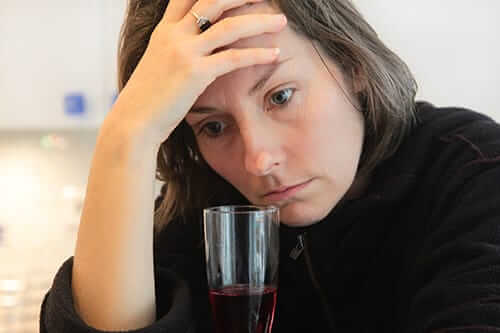
 If you look at ads that promote different alcohol brands, you might conclude that drinking leads to all sorts of happy outcomes. It may be surprising to learn; however, there’s more of a link between depression and alcohol abuse. Alcohol is a depressant, meaning it slows down the body. It also increases the likelihood of feeling depressed. While it’s not always clear which comes first — problem drinking or depression — what is clear is that the two are connected.
If you look at ads that promote different alcohol brands, you might conclude that drinking leads to all sorts of happy outcomes. It may be surprising to learn; however, there’s more of a link between depression and alcohol abuse. Alcohol is a depressant, meaning it slows down the body. It also increases the likelihood of feeling depressed. While it’s not always clear which comes first — problem drinking or depression — what is clear is that the two are connected.
The Connection Between Depression and Alcohol Abuse
Some people start out with a form of depression, whether it’s a mild case of Seasonal Affective Disorder or a more serious one, such as major depressive disorder. A constant feeling of listlessness may lead them to abuse alcohol, in hopes of escaping negative thoughts. The more they drink, the more depressed they become.
Other people don’t start out with depression, but they drink heavily. As their dependence on alcohol grows, they begin feeling down more often than not. Long-term alcohol abuse changes the brain’s chemistry. Not only are they more likely to suffer depression, but they’re also unable to curb their drinking.
Depression often involves persistent feelings of sadness, worthlessness, and guilt. Depressed people feel tired a lot and have trouble concentrating.
Instead of seeking depression treatment, they drink more and more. Their depression and alcohol abuse increase together.
A Vicious Cycle
Once someone gets caught up in the cycle of drinking more and feeling down, it’s hard to break out of it. A person may not realize that instead of making themselves feel better, alcohol abuse contributes to their depression. Also, as alcohol dependency grows, so does the severity of the depression.
Signs that someone has a drinking problem include:
- Constantly craving alcohol
- Continuing to drink, despite suffering job and family problems
- Withdrawing from activities that don’t involve drinking
- Being unable to cut back on drinking
Without treatment for alcohol abuse, a person can develop an addiction and alcoholism. They may require dual diagnosis treatment to deal with both the alcohol addiction and their mental health disorder of depression.
If this sounds like you or someone you care about, it’s not too late to get help. The first step is saying that you need it.
Collaborative Treatment for Sustainable Recovery
Steps to Recovery is a rehab treatment center in Levittown, Pennsylvania. In our supportive and collaborative facility, we encourage clients and their families as they work to overcome drug and alcohol addiction. We maintain an intimate, comfortable environment with a small staff-to-client ratio to ensure personalized care.
Our addiction recovery services include:
- Alcohol addiction rehab program
- Drug addiction rehab program
- Intensive outpatient program (IOP)
- Outpatient treatment program
- Sober living program
If you believe you are suffering from depression and alcohol abuse, reach out to Steps to Recovery. Call today at 267.719.8528 to learn about your options.
Explore this article:
Explore Our Facilities
Drug and alcohol detox and residential treatment for addiction and mental health disorders
Outpatient treatment center for substance use disorder and mental health disorders
Outpatient treatment center for substance use disorder and co-occurring mental health disorders







